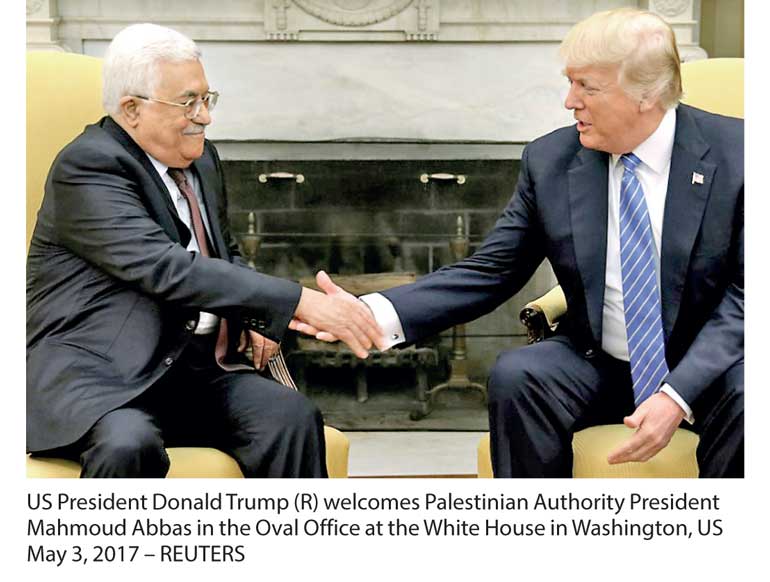Thursday Feb 26, 2026
Thursday Feb 26, 2026
Friday, 5 May 2017 00:00 - - {{hitsCtrl.values.hits}}
 Reuters: President Donald Trump vowed on Wednesday to do “whatever is necessary” to broker peace between Israel and the Palestinians as he hosted Palestinian President Mahmoud Abbas at the White House, but offered no sign of how he could revive long-stalled negotiations.
Reuters: President Donald Trump vowed on Wednesday to do “whatever is necessary” to broker peace between Israel and the Palestinians as he hosted Palestinian President Mahmoud Abbas at the White House, but offered no sign of how he could revive long-stalled negotiations.
In their first face-to-face meeting, Trump pressed Abbas and other Palestinian leaders to “speak in a unified voice against incitement” to violence against Israelis but stopped short of explicitly recommitting his administration to a two-state solution to the decades-old conflict, a long-standing foundation of US policy.
Despite what many experts see as a long-shot bid, Trump told Abbas: “I will do whatever is necessary. ... I would love to be a mediator or an arbitrator or a facilitator, and we will get this done.”
Abbas reasserted the overarching goal of a Palestinian state, saying it must have its capital in East Jerusalem with borders based on pre-1967 lines. Israel rejects a full return to 1967 borders as a threat to its security.
Trump has faced deep scepticism at home and abroad over his chances for any quick diplomatic breakthrough, not least because his administration has yet to articulate a cohesive strategy for restarting the moribund peace process.
Abbas’ White House talks followed a February visit by Israeli Prime Minister Benjamin Netanyahu, who moved to reset ties after a combative relationship with the Republican president’s predecessor, Democrat Barack Obama.
Trump sparked international criticism at the time when he appeared to back away from support for a two-state solution, saying he would leave it up to the parties themselves to decide. The objective of Palestinian statehood has been the position of successive US administrations and the international community.
The meeting with Abbas, the Western-backed head of the Palestinian Authority, was another test of whether Trump, in office a little more than 100 days, is serious about pursuing the kind of comprehensive peace agreement that eluded his predecessors.
Trump said during a joint appearance with Abbas that he was ready to seek the “toughest deal” of Israeli-Palestinian peace. But as he later sat down to lunch with the Palestinian leader, he said it was “maybe not as difficult as people have thought over the years.”
Trump, who said he decided to “start a process” but offered no new policy prescriptions or timetable, may be underestimating the challenge when trust between the two sides is at a low point, analysts said.
“You can’t just pretend you only have to handle a few key issues and that’s it,” said David Makovsky, a senior member of Obama’s negotiating team during the last round of talks, which collapsed in 2014. “It’s very hard.”
Still, plans are being firmed up for Trump to visit Netanyahu in Jerusalem and possibly Abbas in the West Bank, targeted for May 22 and 23, according to people familiar with the matter. That has sparked speculation about a meeting among the three. US and Israeli officials have declined to confirm the visit.
Trump and Abbas appeared friendly but businesslike as they stood at side-by-side lecterns. But it was far less chummy than the way Trump and Netanyahu interacted in February.
Abbas promised that under “your courageous stewardship and your wisdom, as well as your great negotiating ability,” the Palestinians would be partners seeking a “historic peace treaty.”
But under pressure at home to avoid major concessions, the 82-year-old leader said: “It’s about time for Israel to end its occupation,” referring to Jewish settlement building in the West Bank.
He called on Israel to recognise Palestinian independence just as Palestinians recognise the state of Israel. He did not repeat in public his demand that Israel freeze settlement construction on land Palestinians want for a state as a condition for a return to negotiations.
Trump was expected to press Abbas in private to halt payments by the PLO to families of militants jailed by Israel, US officials said.
But Abbas, who governs in the West Bank while Hamas militants rule Gaza, was likely to resist, especially with an ongoing hunger strike by hundreds of Palestinian prisoners. After his two-hour visit to the White House, Abbas was upbeat in a speech to diplomats, think tank experts and reporters. “We have hopes for President Trump,” he said.
In Gaza, Hamas spokesman Sami Abu Zuhri said the promises Abbas made at the White House “don’t obligate anyone.”
Questions have been raised about Trump’s choice of son-in-law Jared Kushner to oversee the peace initiative, along with Trump’s longtime business lawyer, Jason Greenblatt, as envoy.
In addition, efforts to enlist Israel’s Sunni Arab neighbours, who share Israeli concerns about Shi’ite Iran, to help rejuvenate peacemaking have yet to yield tangible results.
Trump’s national security adviser, H.R. McMaster, described his boss’ foreign policy approach as “disruptive,” saying his unconventional ways could create an opportunity to help stabilise the Middle East.
But Trump’s unpredictability has even at times rattled a close ally like Israel.
His pro-Israeli rhetoric during the campaign suggested he might give Netanyahu free rein. But Trump’s promise to move the US Embassy to Jerusalem from Tel Aviv is on the back burner, and he caught Netanyahu off-guard by asking him to put unspecified limits on settlement activity.